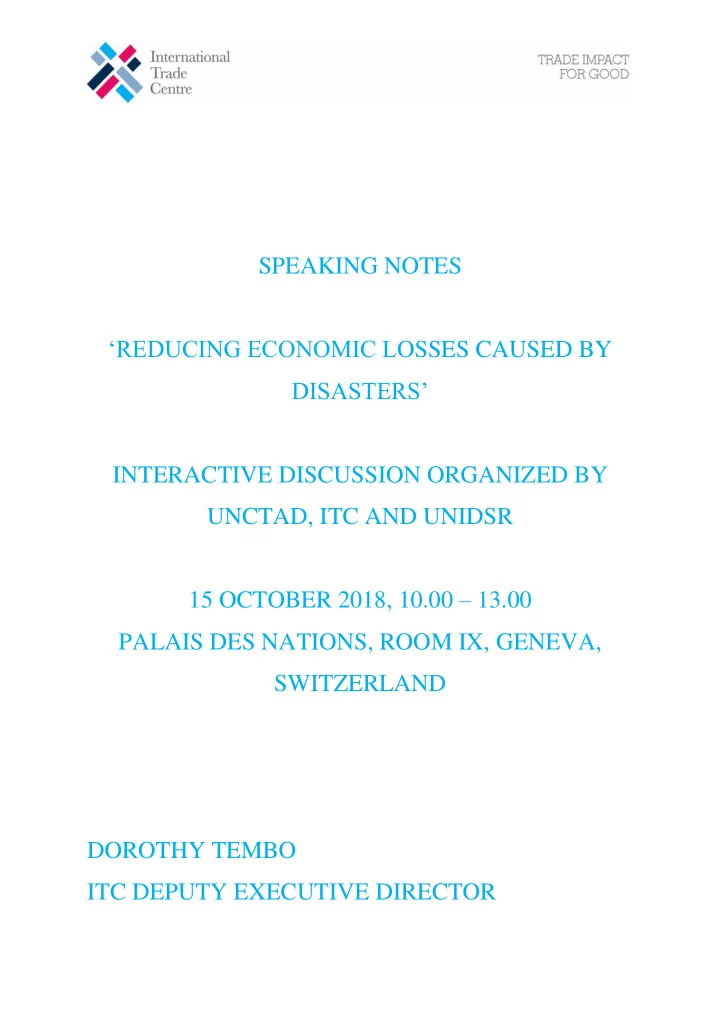

SPEAKING NOTES ‘REDUCING ECONOMIC L OSSES CAUSED BY DISASTERS’ INTERACTIVE DISCUSSION ORGANIZED BY UNCTAD, ITC AND UNIDSR 15 OCTOBER 2018, 10.00 – 13.00 PALAIS DES NATIONS, ROOM IX, GENEVA, SWITZERLAND DOROTHY TEMBO ITC DEPUTY EXECUTIVE DIRECTOR
Formalities/Protocol UNCTAD Deputy Secretary General Isabel Durant and UNISDR Chief of Partnerships, Irina Zodrow Thank delegates of missions for taking the time to engage in discussions with panellists to mark International Disaster Resilience Day. 2018 has been a landmark year in the public awareness about natural disasters. Hurricanes in the Caribbean, the earthquake and tsunami in Sulawesi and extended European heatwaves have wreaked havoc on people’s lives and livelihoods and incurred huge economic costs. Many of these disasters are due to extreme weather events, which the science tells us are driven by climate change. The recent report published by the Intergovernmental Panel on Climate Change (IPCC) Global Warming of 1.5C made a clarion call to the international community that climate change represents an urgent and potentially irreversible threat to human societies and the planet. And, the latest World Economic Forum Global Risks Report clearly identifies extreme weather events as the most likely global risk to occur having the largest impact on society, second only to the impact of weapons of mass destruction. At an economic level, these events are imposing very high economic costs on developing countries. Figures published last week by the UN Office for Disaster Risk Reduction show that between 2006 and 2017, the estimated direct economic cost of disaster was USD2.9 billion. USD2.2 billion of this total, just under 80% was related to climate change. The report also emphasises that it is the poor and vulnerable who suffer disproportionately. The real global economic cost is estimated by the World Bank to be USD 520 billion per year. [2]
Marking International Day for Disaster Resilience, The Secretary General of the United Nations has underlined the high economic and social costs of disasters and the need to build resilience. The Sendai Framework, adopted by UN Member States in 2015, aims at achieving substantial reduction of disaster risk and losses in lives, livelihoods and health. This framework recognizes that the State has the primary role to reduce disaster risk but that this responsibility should be shared with other stakeholders - including the private sector and local governments. Trade also has a key role to play in building resilience and support reconstruction. Maintaining the private sector’s access to markets and global supply chains is important to build resilience and assist recovery after disasters strike. Given the importance of the private sector to deliver key services in preparedness for example in insurance or in response for example in logistics and food, it therefore makes sense to build a business environment that is enables SMEs to innovate and grow. ITC’s key clients are SMEs who make up as much as 90% of economic activity in developing countries. As outlined in ITC’s 2016 annual Competitiveness Report , the core drivers of SME competitiveness are not just firm’s internal capabilities but also the immediate business and policy environments in which they operate. This includes the degree to which firms can access labour as well as operate in well-functioning markets; ease of doing business; good infrastructure and governance. Achieving these competitiveness objectives will make a strong contribution to disaster and climate resilience. These are the policy level messages. ITC is also very active working on the ground with SMEs in addressing climate risks. The ITC survey of agri SMEs in Uganda and Peru 2015 revealed exporters viewed climate change as one of the [3]
top three threats to their business and underlined the need for Aid for Trade to mainstream responses to climate challenges. Findings from this and related surveys underline the need for Aid for Trade to mainstream responses to climate challenges by which we mean to systematically assess climate and disaster related risks and take action to mitigate these risks. The tag line of today’s event is: If it’s not risk -informed, it’s not sustainable. If it’s not sustainable, it has a human cost . In response, ITC has implemented its Climate Resilience project this year funded by GiZ that works with companies in Morocco and Kenya the textile and agri food sectors to measure risks and prepare adaptation plans for funding. Given the high proportion of projects implemented in the agri food and textile sectors, these services will be further rolled out. In closing, let me reassure you that ITC stands ready to play its role and provide its expertise to these important tasks of alleviating the socio-economic impact of disasters and build greater short-term and longer-term resilience. Thank you. [4]
Recommend
More recommend